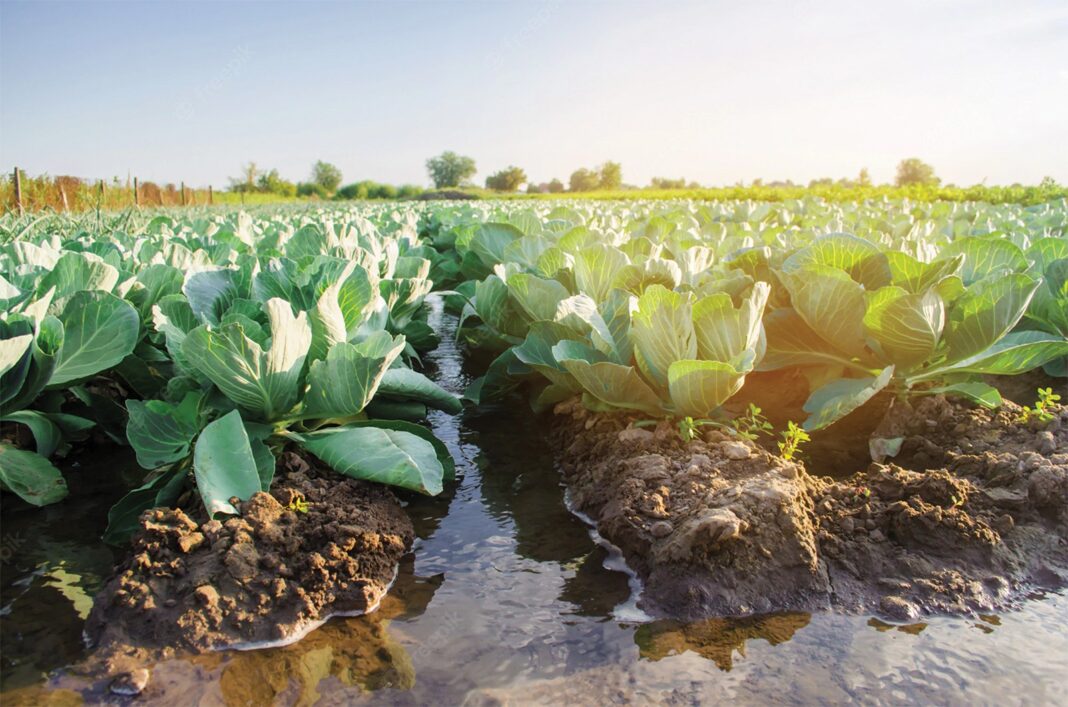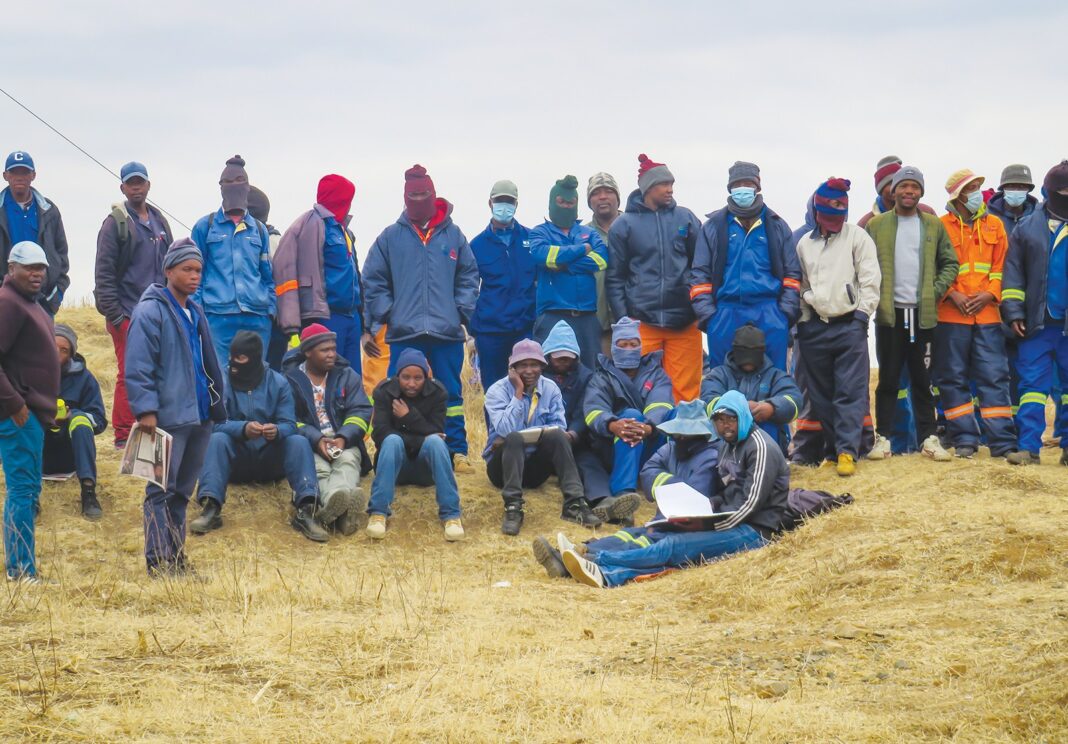By ‘Majirata Latela
Rain-fed irrigation in Lesotho is becoming more and more untenable with each season due to rapidly changing climate conditions, further highlighting the need to switch to more reliable and advanced methods of irrigation.
More than 70 percent of the population in rural Lesotho is engaged in subsistence farming. Productivity has been deteriorating since the early 1990s because of unpredictable weather conditions, including inconsistent rains and persistent and recurring droughts.
Reports describe irrigation as one of the major inputs of agriculture which plays an important role in its development. It is said to provide an opportunity for the increase in quantity of agricultural production thereby regarded as the major invariable component for agricultural development.
The 2019 World Bank Smallholder Agricultural Development Project II report indicates that climate change poses a major development challenge in Lesotho and the agricultural sector remains highly vulnerable to its impacts.
According to the report irrigation is critical for mitigating climatic risks and increasing productivity and commercialization in Lesotho’s agricultural sector. Less than one percent of crop production in Lesotho is under irrigation and almost all smallholder farming is rain-fed. Of the total agricultural land of 2.3 million hectares.
The 2017 World Bank report shows that irrigable land is estimated at about 25,000 hectares and only 0.05 percent of the total agricultural land was under irrigation in 2014 despite the abundant water resources and the great potential of the country’ highlands for water supply.
Last week, theReporter visited the Nkhaketse irrigation projects which are considered to be big in the country at the Hololo river in Botha- Bothe. The project covers about 17 hectares of land which is used by communities nearby who grow vegetables and maize for subsistence and commercial purposes.
According to Senephane Mokhele, one of the farmers growing vegetables with the help of the irrigation facility, since the inception of the projects in 1989 he and other farmers have been consistently growing vegetables and staple food except sorghum in the fields. He said even though Lesotho is feeling the effects of climate change, farmers there have been able to continue producing even at the time the country experienced harsh El Nino. (El Niño is a climate pattern that describes the unusual warming of surface waters in the eastern tropical Pacific Ocean).
“The project was meant to supply the whole country with vegetables and we have been able to continue producing since then. People come from all districts to buy our produce. We have also attracted the market from neighbouring communities in the South African side, but the challenge has been on clearing the goods and has hindered many of our customers from freely buying and crossing the borders with our produce.
“With the project, I have for years been able to feed my family, build a house and take my children to schools. My children have now graduated from colleges and all these I have achieved with the money that I make from selling the produce. From just one hectare of the fields here when I have planted carrots and beetroot, I am able to make M60 000 from selling the produce.
“We sell to businesses, hotels, street vendors and individuals. We however, still experience challenges with the lack of market for our produce because even the mines here in Lesotho which are very close to us do not buy our produce. They would rather buy from shops that import vegetables,” Mokhele said disappointedly.
He added that as the beneficiaries of the project, they contribute money as farmers to buy electricity so that they can be able to pump water into the dam which is constructed uphill the project. He also showed that just like in any other business challenges are still persisting over the years but have learned how to overcome them.
He believes if the government can fully support agriculture many lives could change and the economy of the country could grow drastically.
The publication further approached the ministry of agriculture and food security’s department of crop services’ chief agricultural engineer, Selebalo Moeketsi who agreed with the World Bank report that irrigation in Lesotho is still at an infant stage. He said the underlying challenges include lack of capacity in the whole agricultural sector and the absence of legal frameworks that support irrigation.
He also showed that Lesotho has two types of irrigation systems, high-pressure and low-pressure irrigation systems. The high-pressure type of irrigation system is only found in two districts of Botha-Bothe and Maseru (two irrigation systems in Hololo River and another one in Masianokeng).
Moeketsi pointed out that the two projects in Botha-Bother are still working while the one in Masianokeng (107 hectares) is no longer working as it experienced a lot of challenges. He said the ministry is looking for farmers who can form a cooperative to produce on a large scale.
He added: “We are still looking for potential investors to invest in those fields.”
Another challenge was experienced when some farmers started using their land in that areas for cannabis growing and started removing the topsoil which was good for agriculture and preparing their fields for cannabis farming.
With the low-pressure type of irrigation which he said they use the gravity fed system of fetching water, water is collected from water sources and pumped into reservoirs. The water, he said, then goes down by gravity to the fields. This type of irrigation, he said, was found in Berea, Maseru, Mafeteng, Mohale’s Hoek and Quthing currently.
“We are currently working on institutional arrangement. In the ministry, irrigation is still just a small section with a few officers. At district level where the work is done, we only have one irrigation technician thus impossible to serve the whole country with such a small number of officers.
“We are also finalising the national development irrigation policy. These are only a few of the challenges that I can say hinder the country to make sure that irrigation is accessible to all the farmers. Also, the other challenge is with the budget; we have not had a budget for irrigation for the past two financial years including the current financial year,” he regretted.
Moeketsi further added that Lesotho Millennium Challenge Cooperation (MCC) compact II has also plans for irrigation projects which will be in Phamong, Ha Manka, Tsoili-Tsoili and Likhakeng.
The Lesotho Millennium Development Agency is working together with the ministry of agriculture in these projects
However, he showed that non-governmental organisations also have some irrigation projects upon which they have jointly embarked on with the communities. But due to lack of policy, coordination has been difficult as farmers worked in silo with no feasibility studies being undertaken.
According to an MCC compact fact sheet, the Lesotho Health and Horticulture Compacts aims to benefit 2.5 million people by growing, strengthening, and organising the private sector in Lesotho and improving the government’s coordination to deliver critical services necessary to support private sector development. It will also improve Lesotho’s climate resilience by replacing rain-fed subsistence farming with irrigated water in selected locations.
During the MCC signing ceremony held in Maseru on May 12 2022, United States Ambassador, Maria Brewer said by focusing on rural economic development through irrigated horticulture, the new compact addresses a significant obstacle for rural communities.
Project aims to increase rural incomes and fight food insecurity through investing in climate-smart irrigation infrastructure and attracting commercial farmers to collaborate with local, small-holder famers to produce high-value crops and build strong value chains.
“MCC’s second compact with the Government of Lesotho seeks to ensure greater access to quality healthcare, create equitable business development opportunities, invest in high-value crop production, and boost profits and formal employment for women and youth owned enterprises,
“The compact also aims to address some of the unique challenges faced by women and youth in Lesotho by providing better legal protections in land tenure and more skills training and business development opportunities. The compact is comprised of three projects designed to combat constraints to economic growth by either strengthening private sector participation or by improving government coordination, capacity, and execution,” reads the MCC fact sheet.








